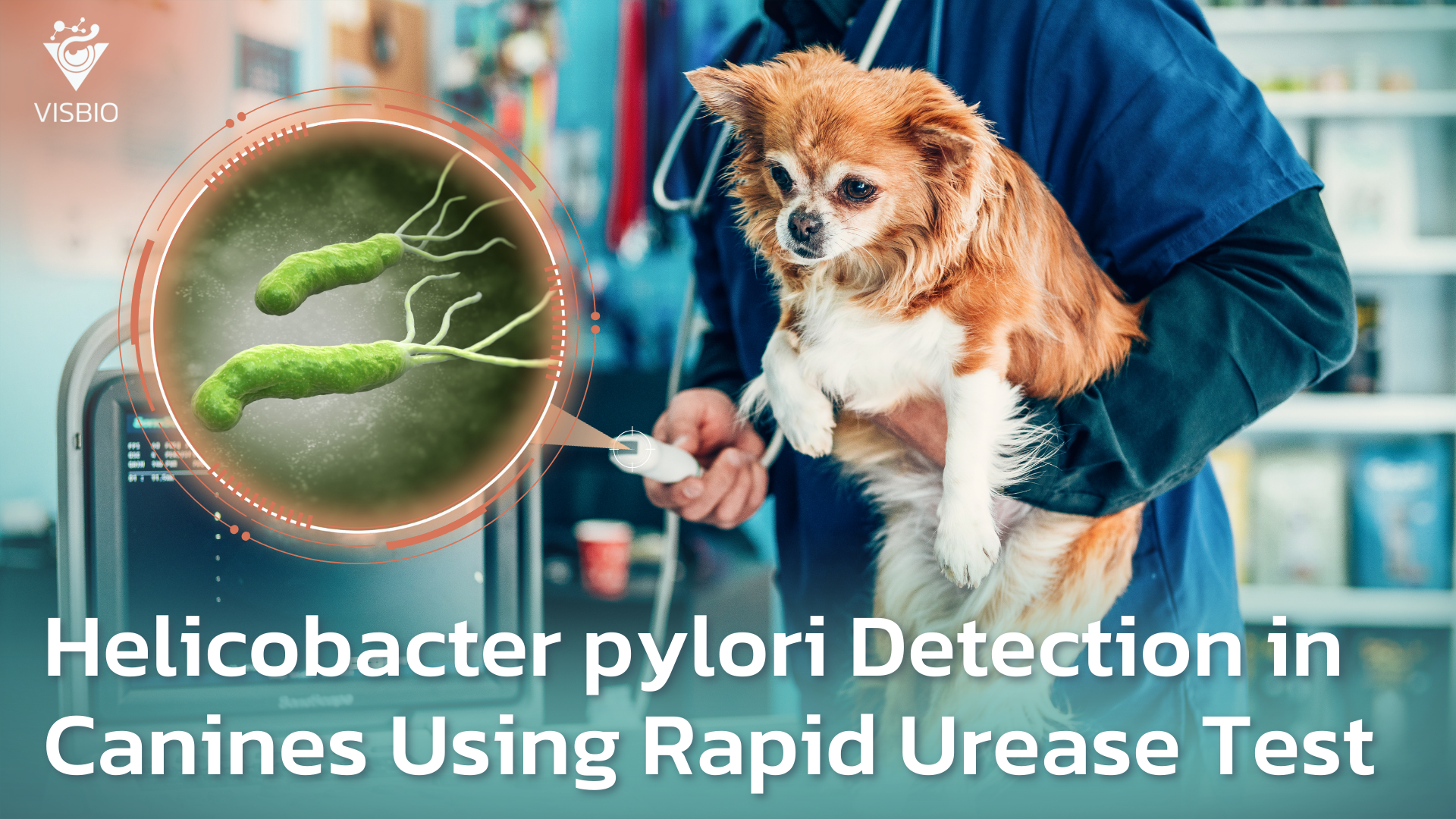A Breakthrough in Veterinary Diagnostics
Helicobacter pylori (H. pylori) is a significant cause of chronic gastritis in both humans and animals, and if left untreated, it can lead to more severe conditions such as gastric ulcers and even cancer. For dogs, H. pylori infections pose similar risks, and early detection is essential for effective treatment. Traditional diagnostic methods, such as polymerase chain reaction (PCR) and histopathology, although effective, are often expensive, time-consuming, and complex. This limits their use in routine veterinary practice, particularly in smaller clinics or field conditions.
The recent development of an easy-to-use rapid urease test (RUT) kit by Associate Professor Dr. Kiattawee Choowongkomon and his team represents a significant advancement in the field. This affordable and simple diagnostic tool enables veterinarians to detect H. pylori infection quickly and accurately in dogs, reducing the need for expensive, labor-intensive procedures.
A Game-Changer in H. pylori Detection
The rapid urease test (RUT) developed in this study is designed to detect the presence of urease, an enzyme produced by H. pylori that facilitates bacterial colonization in the stomach. The test works by detecting a change in pH due to the breakdown of urea, which results in a color change from red to yellow when H. pylori is present.
Why Rapid Urease Test Matters for Veterinary Clinics?
With this new urease kit, veterinarians can quickly and accurately diagnose H. pylori infections. The test is highly specific, with results comparable to the commercially available Hp Fast™ kit but at a significantly lower cost. This accessibility makes the kit particularly useful for veterinary practices that need affordable and reliable diagnostic tools.
In addition, the kit’s simplicity allows veterinarians to perform the test in-house, avoiding the delays and costs associated with sending samples to a laboratory. By reducing diagnostic turnaround time, veterinarians can initiate treatment sooner, improving patient outcomes and overall clinic efficiency.
Cost-Effective and Scalable for Real-World Use

One of the biggest advantages of the urease test kit is its affordability. The materials required to produce the kit are inexpensive, making it an attractive option for both large and small veterinary clinics. The kit can be stored for up to six months, ensuring it remains viable for long-term use in clinical settings.
The development of this kit provides a scalable solution for H. pylori detection in dogs. Whether used in large-scale veterinary hospitals or smaller clinics, this tool ensures that early detection is available to all, regardless of the size of the practice or location.
What Does This Mean for Your Business?
Faster Diagnosis, Better Patient Care
 For veterinary clinics, having a fast and reliable diagnostic tool for H. pylori can significantly improve patient outcomes. Early diagnosis allows for timely intervention, helping to prevent more severe complications like ulcers and cancer. With this urease test kit, veterinarians can quickly diagnose H. pylori infections, enabling faster decision-making and offering better care to their patients.
For veterinary clinics, having a fast and reliable diagnostic tool for H. pylori can significantly improve patient outcomes. Early diagnosis allows for timely intervention, helping to prevent more severe complications like ulcers and cancer. With this urease test kit, veterinarians can quickly diagnose H. pylori infections, enabling faster decision-making and offering better care to their patients.
Cutting Costs While Maintaining High Standards

By integrating this cost-effective diagnostic tool into your clinic, you can reduce the overhead costs associated with traditional diagnostic methods. The kit is inexpensive, easy to store, and simple to use, allowing clinics to provide high-quality diagnostics without the high price tag. This not only enhances the financial efficiency of your practice but also provides clients with affordable diagnostic options without sacrificing quality.
Strengthening Client Trust and Clinic Reputation

Adopting this advanced diagnostic technology positions your veterinary clinic as a leader in innovation and patient care. Clients will appreciate the fast, affordable, and accurate results that allow for quicker treatment decisions, which can lead to better patient outcomes. By offering cutting-edge diagnostics, yo u build trust and loyalty with pet owners, strengthening your clinic’s reputation for quality care.
Real-World Impact

The development of this urease test kit for detecting H. pylori in dogs is a game-changer for the veterinary world. It combines accuracy, affordability, and ease of use, making it an invaluable tool for clinics of all sizes. By integrating this technology into your diagnostic services, you not only improve your clinic’s efficiency but also contribute to better animal health and overall welfare.
The success of this research demonstrates the potential for simple, accessible diagnostic tools to transform how veterinarians approach common infections like H. pylori. Whether you’re managing a large veterinary hospital or running a small clinic, this test kit can enhance your ability to diagnose and treat infections, leading to better outcomes and stronger client relationships.
Partner with Us for Cutting-Edge Diagnostic Solutions
If your clinic is looking to enhance its diagnostic capabilities, consider integrating this urease test kit into your practice. Contact us today for a free consultation on how this kit can help you provide faster, more affordable, and highly accurate diagnostics for your patients. Let’s work together to bring the future of veterinary diagnostics to your clinic.
About the Author
 Associate Professor Dr. Kiattawee Choowongkomon is a leading expert in biochemistry, specializing in the development of biosensors and diagnostic tools for both human and animal health. Based at Kasetsart University, Dr. Choowongkomon has reseach published works and has contributed to numerous breakthroughs in the veterinary and biomedical fields.
Associate Professor Dr. Kiattawee Choowongkomon is a leading expert in biochemistry, specializing in the development of biosensors and diagnostic tools for both human and animal health. Based at Kasetsart University, Dr. Choowongkomon has reseach published works and has contributed to numerous breakthroughs in the veterinary and biomedical fields.
About the Research
This study focuses on the development of a rapid urease test (RUT) for detecting Helicobacter pylori in the gastric mucosa of canines. The test is highly sensitive and specific, providing fast results at a lower cost compared to traditional methods like PCR. The study was published in Veterinary World with DOI: 10.14202/vetworld.2021.1977-1987.


